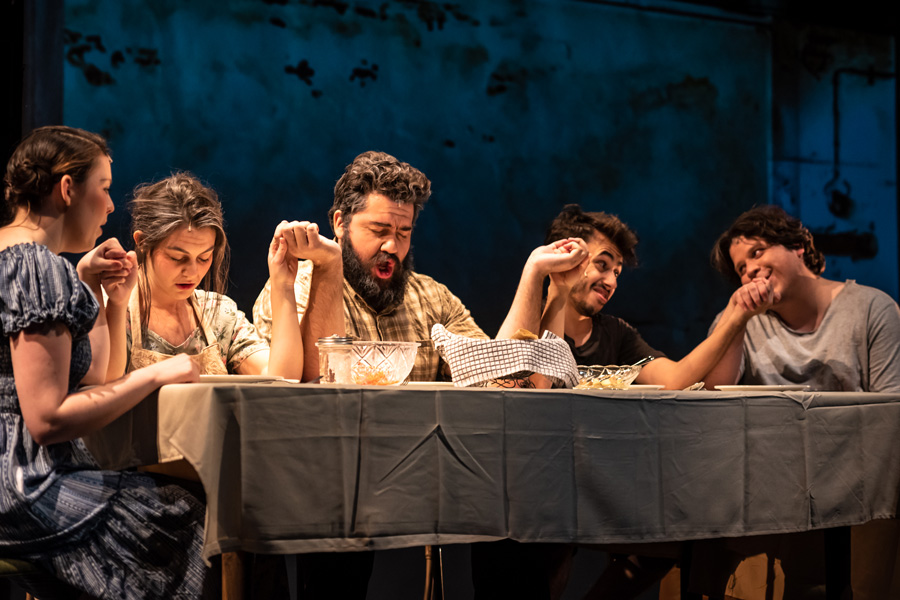David T. Little’s “Dog Days” brings a modern opera to Northwestern
Benjamin Bomier/The Daily Northwestern
The cast of “Dog Days” in rehearsal. The modern opera follows a family struggling in the post-apocalyptic world.
November 21, 2019
Bienen Senior Morgan Mastrangelo sang in numerous operas at Northwestern. But in “Dog Days,” the latest opera opening in Ryan Opera Theater, he’s taking on his most challenging role yet: a character who doesn’t speak at all.
“I’ve sung a lot of music in my life, and the idea of being a character in an opera who doesn’t sing at all, but still has to interact with the music and be musical in the way he interacts with characters was a really fascinating acting challenge for me as a singer,” Mastrangelo said.
“Dog Days” is a modern opera, first staged in 2012 at Montclair State University. Composed by David T. Little, the show follows a family in a post-apocalyptic world whose lives are upended when they take in a mute homeless man dressed in a dog suit, played by Mastrangelo. Bienen’s production is the Chicago-area premiere of the opera and will open this Thursday and run to Nov. 24.
As the director of this production, Bienen Prof. Joachim Schamberger said he was interested in producing the opera because of its timely themes. The show explores how people lose sight of their humanity in the face of an uncertain future, an idea Schamberger said resonates with current college students.
Schamberger added that the show can offer NU students a rewarding experience because it is so contemporary. While many opera companies focus on producing hundred years-old classics, Schamberger thinks exposing students to recent work helps them realize that opera can be a classical and modern medium.
“The perception that opera is an old artform is partially true,” Schamberger said. “But there are many many contemporary pieces produced in America. It’s wonderful for opera in general, and so it’s very important to expose students to in school because it’s very likely something they will do in their professional lives, and it’s subject matter that concern us right now.”
Alan Pierson, who conducted the original “Dog Days,” returned as the conductor for the Bienen’s production. In addition, Little’s has acted as an advisor to the cast members to help them understand the work. There are many benefits to work alongside living creators, Schamberger said.
Bienen graduate student Marin Tack, one of two actors who alternate the role of Lisa, agrees with Schamberger. She said while the original creators have offered valuable guidance, they’ve also allowed them to define this production as a separate entity.
Tack said “Dog Days” is the most challenging opera she’s been in. According to Tack, the score of the show is highly modern and operatic with a touch of pop and rock influences. The score incorporates electric guitar and synthesizer, and is written in conversational English. Tack said this type of score is highly unusual and difficult for Bienen students, but it’s been rewarding to overcome these difficulties with the rest of the cast.
“I was initially attracted to this because of the music because of how different it is,” Tack said. “I’ve never sang anything quite like this. I love singing opera of course, but I also love incorporating different styles into my singing, and this was the perfect opportunity to do that.”
Mastrangelo said the themes of “Dog Days” can resonate with younger audiences who constantly wonder what the future holds given current world affairs.
According to Mastragelo, the show’s central conceit is how humanity changes when our lifestyles undergo a massive shift. Mastragelo said young generations will have to consider this question, especially because of uncertainty about what the world will look like in 50 years.
“It kind of holds up a mirror and says, ‘are we prepared to deal with these consequences of our actions?’” Mastrangelo said. “And it’s rare to see that in the world of art, even more so in the world of opera, held up to you for the world to see.”
Email: [email protected]
Twitter: @wilsonchapman6












